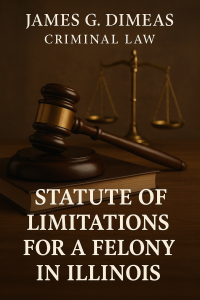 As a seasoned criminal defense attorney with decades of experience handling felony cases throughout Cook County, DuPage County, Kane County, Lake County, and the greater Chicago area, one of the most important questions I regularly address with clients is whether they can still be charged with a crime after many years have passed. This issue hinges on what’s known as the “statute of limitations.”
As a seasoned criminal defense attorney with decades of experience handling felony cases throughout Cook County, DuPage County, Kane County, Lake County, and the greater Chicago area, one of the most important questions I regularly address with clients is whether they can still be charged with a crime after many years have passed. This issue hinges on what’s known as the “statute of limitations.”
In this blog post, I’ll explain what the statute of limitations is, how it applies to felony charges in Illinois, the exceptions that can extend or eliminate these time limits, and what happens if you’re charged after the statutory period has expired. I’ll also discuss real-world examples and why having an experienced criminal defense attorney like myself is crucial if you’re facing a felony charge that may be time-barred.
 Chicago Criminal Lawyer Blog
Chicago Criminal Lawyer Blog











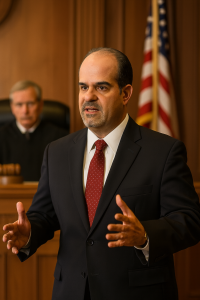 Being charged with a
Being charged with a  If you’ve been accused of shoplifting in Illinois, you’re probably wondering how long the authorities have before they can arrest and charge you with Retail Theft. As a seasoned criminal defense attorney with over 32 years of experience defending clients across the Chicago area, I can tell you that
If you’ve been accused of shoplifting in Illinois, you’re probably wondering how long the authorities have before they can arrest and charge you with Retail Theft. As a seasoned criminal defense attorney with over 32 years of experience defending clients across the Chicago area, I can tell you that 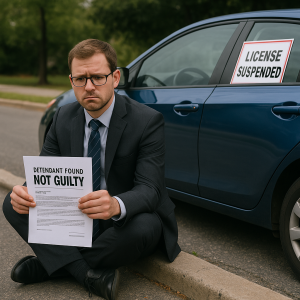 As an experienced DUI defense attorney in Illinois, one of the most common and confusing questions I get from clients is this: “Can my license still be suspended even if I’m found not guilty of a DUI?” The answer is yes—under Illinois law, your driver’s license can be suspended even if you beat the DUI charge in court. This surprises many people and is often one of the most frustrating aspects of a DUI arrest.
As an experienced DUI defense attorney in Illinois, one of the most common and confusing questions I get from clients is this: “Can my license still be suspended even if I’m found not guilty of a DUI?” The answer is yes—under Illinois law, your driver’s license can be suspended even if you beat the DUI charge in court. This surprises many people and is often one of the most frustrating aspects of a DUI arrest. If you are facing criminal charges in Illinois, understanding your options for resolving your case is crucial. As an experienced criminal defense attorney, I often explain to my clients the key differences between Conditional Discharge and Court Supervision, two sentencing alternatives available in Illinois. Both can help you avoid jail time, but they come with different consequences and benefits. Knowing the difference can impact your future, your criminal record, and your ability to move forward after a legal issue.
If you are facing criminal charges in Illinois, understanding your options for resolving your case is crucial. As an experienced criminal defense attorney, I often explain to my clients the key differences between Conditional Discharge and Court Supervision, two sentencing alternatives available in Illinois. Both can help you avoid jail time, but they come with different consequences and benefits. Knowing the difference can impact your future, your criminal record, and your ability to move forward after a legal issue. Shoplifting
Shoplifting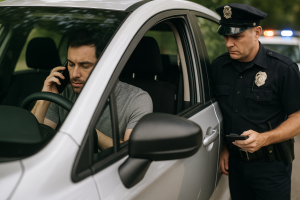 As a criminal defense attorney with over 32 years of experience handling traffic and criminal offenses throughout Cook County, DuPage County, Kane County, Lake County, and the greater Chicagoland area, I’ve seen firsthand how aggressively law enforcement officers enforce the Illinois Distracted Driving Cell Phone Law. This blog post will break down everything you need to know about this law—from its purpose and enforcement tactics to the penalties for violations and tips for staying compliant. Whether you’ve already received a ticket or are trying to avoid one, this guide is for you.
As a criminal defense attorney with over 32 years of experience handling traffic and criminal offenses throughout Cook County, DuPage County, Kane County, Lake County, and the greater Chicagoland area, I’ve seen firsthand how aggressively law enforcement officers enforce the Illinois Distracted Driving Cell Phone Law. This blog post will break down everything you need to know about this law—from its purpose and enforcement tactics to the penalties for violations and tips for staying compliant. Whether you’ve already received a ticket or are trying to avoid one, this guide is for you. As a criminal defense attorney with over three decades of experience representing clients charged with Retail Theft and Burglary throughout Illinois, I’m often asked whether someone can be charged with Burglary for what seems like a simple act of shoplifting. This question arises frequently, especially in Cook County, DuPage County, Kane County, and other parts of the Chicago metropolitan area where prosecutors take a hard stance on theft-related crimes. The answer is yes, under certain circumstances, a person can be charged with Burglary for shoplifting, and the implications of such a charge are far more serious than most people realize.
As a criminal defense attorney with over three decades of experience representing clients charged with Retail Theft and Burglary throughout Illinois, I’m often asked whether someone can be charged with Burglary for what seems like a simple act of shoplifting. This question arises frequently, especially in Cook County, DuPage County, Kane County, and other parts of the Chicago metropolitan area where prosecutors take a hard stance on theft-related crimes. The answer is yes, under certain circumstances, a person can be charged with Burglary for shoplifting, and the implications of such a charge are far more serious than most people realize.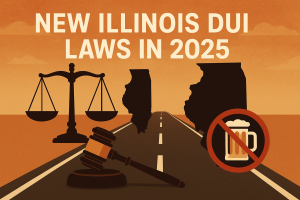 Driving under the influence (DUI) is one of the most serious and aggressively prosecuted offenses in Illinois. If you are facing DUI charges in 2025, you need to understand how Illinois DUI laws work, what penalties you may face, and how an experienced criminal defense attorney like James Dimeas can help protect your rights and your future.
Driving under the influence (DUI) is one of the most serious and aggressively prosecuted offenses in Illinois. If you are facing DUI charges in 2025, you need to understand how Illinois DUI laws work, what penalties you may face, and how an experienced criminal defense attorney like James Dimeas can help protect your rights and your future.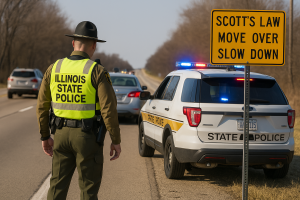 If you’ve recently received a Scott’s Law ticket in Illinois, you’re probably worried about what happens next. You may be asking yourself questions like:
If you’ve recently received a Scott’s Law ticket in Illinois, you’re probably worried about what happens next. You may be asking yourself questions like: